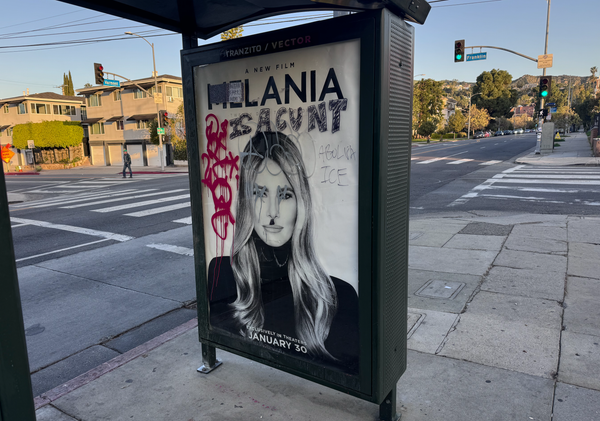Why Facebook decided to kill the news
If you're an Australian Facebook user, forget about posting news. You're no longer allowed. No news for you!

Hey.
Sometimes in this war of misinformation there are tiny wins. Earlier this week, Instagram finally decided to boot Covid-denier and QAnon enthusiast Pete Evans off their platform.
Seems good, right?
Well, if you’re in Australia and tried to post that news on your Facebook wall — you wouldn’t be allowed. Because Australian Facebook users have now been blocked from sharing links to legitimate news sites.
It’s utterly fucked up, and today Dylan Reeve explains what the hell is going on.
David.
Things falling apart.
It was mid-morning Thursday in Australia when it all started to fall apart. Facebook started to seem a little off. Posts were disappearing, links were being removed, and news organisations that wanted to share stories about what was happening found they could no longer post on the platform. Their pages had been stripped bare.
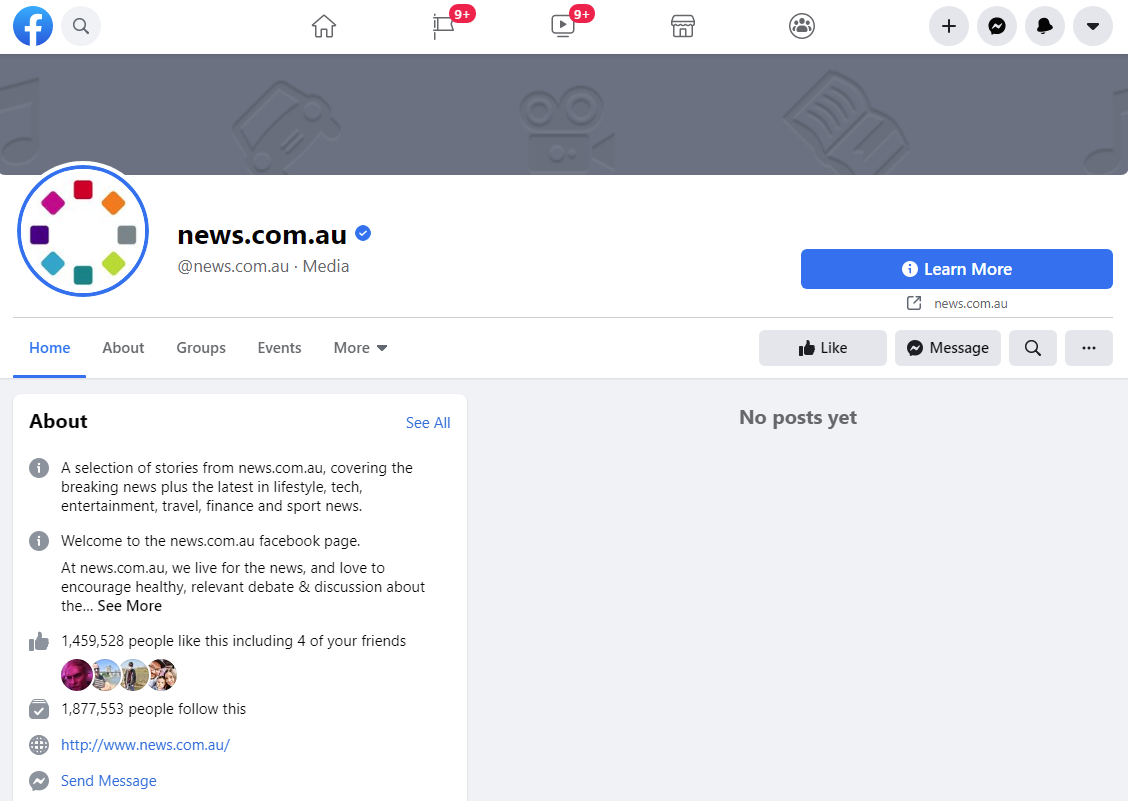
Facebook had killed Australian News on their platform. You couldn’t post news links on your timeline anymore, or link to a news story in your comments on other people’s posts.
If it was news and ended in “.au” — it was no longer allowed on Facebook.
Facebook’s drastic action, it explained in a press release, was in response to the proposed Media Bargaining law. According to the Australian government the law is intended to “address bargaining power imbalances between Australian news media businesses and digital platforms, specifically Google and Facebook” — but Facebook argues that the law “fundamentally misunderstands the relationship between our platform and publishers who use it to share news content.”
The action that Facebook took was extreme, and potentially very harmful.
australia — get ready for your facebook experience to be filled with nothing but dangerous misinformation and disinformation.
— David Farrier (@davidfarrier) 9:51 PM ∙ Feb 17, 2021
they’ve essentially just banned sharing real, external news on facebook in australia.
this is terrifying —
As David noted in a tweet, Australians could now find their Facebook feeds “filled with nothing but dangerous misinformation and disinformation” as the void created by the loss of real news would be filled instead with unregulated content from dubious sources.
There were more immediate and direct risks too, as outlined by tech analyst Ariel Bogle on Twitter where she noted that the ban meant “ABC Broken Hill can’t post an article about where to get the covid vaccine on Facebook” and “ABC South West can’t livestream the bushfire conference.”
As we all know Facebook is evil, so it’s easy to assume they were being evil here. But were they?
Unfortunately, probably not.

Who’s to blame?
Their actions are very extreme, and arguably premature (the law isn’t a law yet) but their position is, quite possibly, right. And the timing is clearly intended to influence the passage of the bill into law.
While platforms like Google often excerpt and summarise the content of the news sites they index, effectively taking the content from those sites and making use of it themselves, that’s not what Facebook does. Facebook as a platform only provides a link to the content. It isn’t extracting the text of these news articles and re-publishing it, it’s just providing a link that you click which takes you to the story.
Hyperlinking is the absolute foundation of the World Wide Web. While it’s hard to remember now (and many people never experienced it at all) the original web was just an endless series of pages linking to one another. The once-giant Yahoo! got its start on the internet by being a portal to the early web. Before search engines were really a thing there were sites like Yahoo! that were just a categorised collection of links to other websites.
However according to the Australian law, platforms like Facebook wouldn’t just need to pay to post actual copies of news content, but also to simply link to the website where it’s hosted.
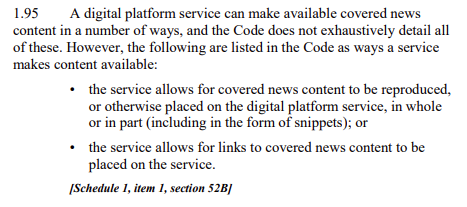
For now the platforms impacted by the law are massive multinational corporations with seemingly infinite pockets, but will that remain the case? Could it soon be illegal for me to post a link to The Sydney Morning Herald here without paying them?
At this stage I find myself in the uncomfortable position of agreeing with Facebook.
Their actions are harmful and reckless, but they are a direct response to a badly considered and potentially destructive law on the verge of being passed by the Australian Government.
In saying that, there are some ways in which — no matter what their justification — Facebook has very dramatically messed up in the actions they’ve decided to take, most notably in not having a plan in place to rapidly correct obvious errors in classification. Because now, no matter how good their arguments, we are faced with dozens of examples of vital non-news related content having been sink-holed.
Like… really vital stuff.
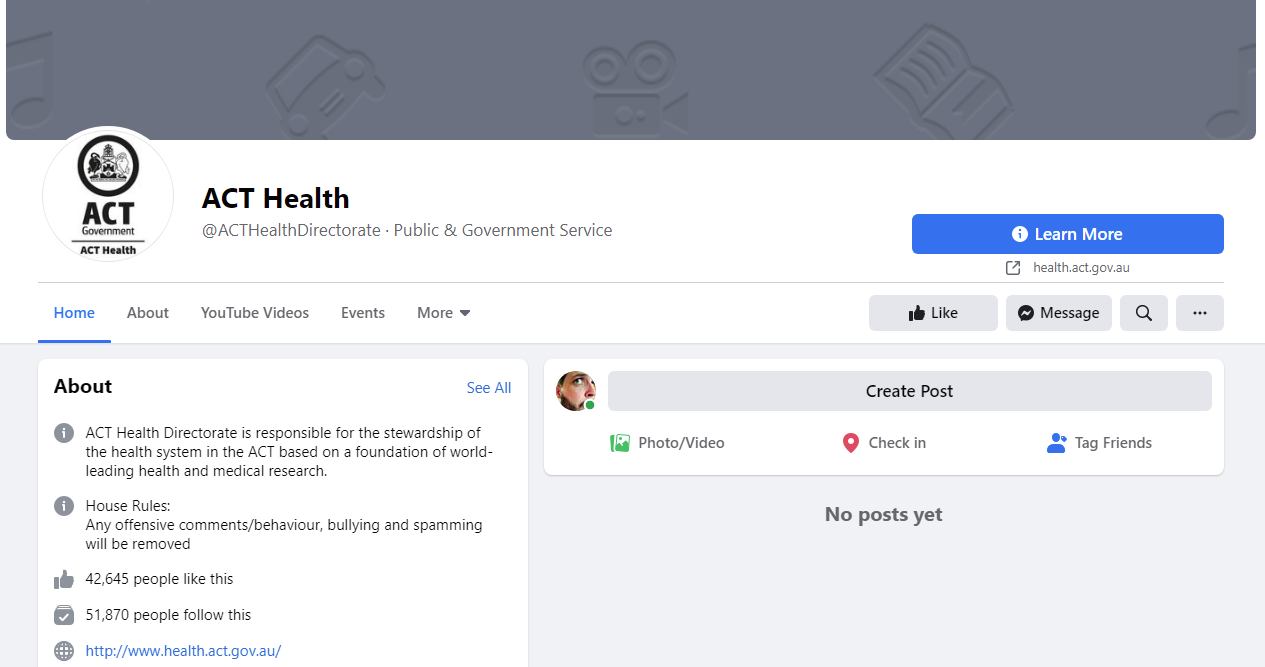
Now it’s a matter of waiting to see who needs who the most. Do Australian news organisations need the traffic generated by Facebook links more than Facebook needs to be able to let users link to news organisations?
My bet is that the news organisations are going to feel the squeeze on this before Facebook does.
Dylan Reeve.
PS: If you want to share this Webworm, it’s webworm.co/p/newsban.
So yeah — Australian lawmakers and Facebook have really fucked this one up.
Australian Facebook is going to a littered with the type of health misinformation Instagram kicked Pete Evans off for. And the kicker — Facebook owns fucking Instagram. Ughhh.
It’s really important in a democracy that news is shared openly online. Look, there’s a reason the military switched Myanmar’s internet off after arresting their democratically elected leader. And as the world gets increasingly complex and terrifying, it’s vital news is shared as openly and widely as possible. Especially during a pandemic!
And sure — Facebook isn’t the internet — but the fact is it’s where billions of people spend a great deal of their internet lives. Including Australians.
Today, the trickle down effect is everywhere. A guy in Brisbane just sent me this.
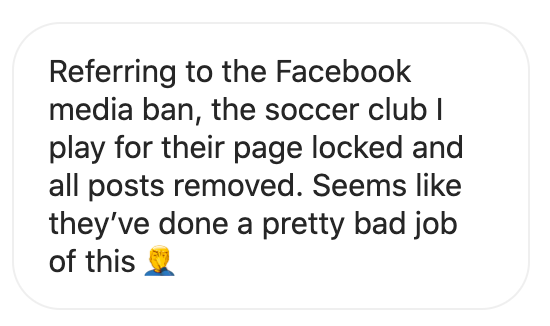
Face palm, indeed.
David.
PS This is all so depressing. Have a kitten. He isn’t mine, but I visit him often. His name is Napoleon, and he likes sleeping on your neck. I think he’s more of a Sebastian to be honest, but he’s not my cat so I don’t make the rules.



